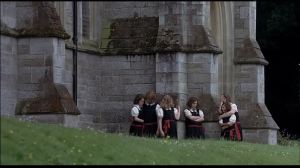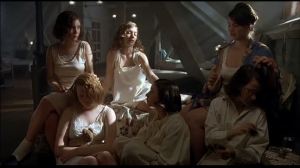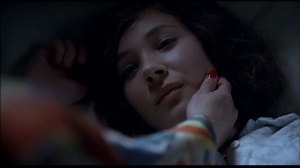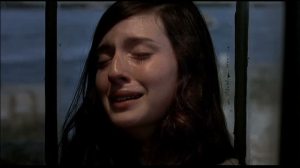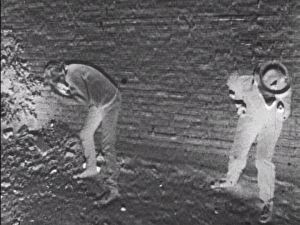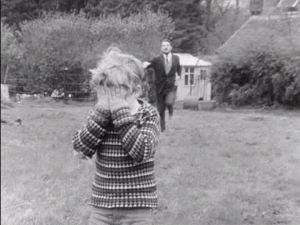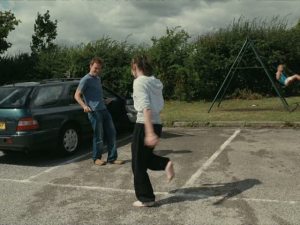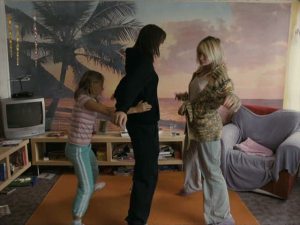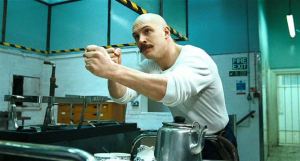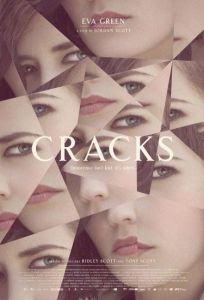 I’ll have to admit upfront, I like boarding school movies. There is something about the isolation; the enclosed space of solitude among rigorous collective order that makes me interested from the get-go. And, of course, the plaid uniforms aren’t bad either. Having said that, this movie has so much else going on. For one, it stars the incomparable Eva Green. Having managed to move from Bertolucci seductress to historical queen to Bond girl to a most recently movie-stealing turn as a vamping vampiress, she is pretty impressive (some may emphasize the pretty more than the impressive, but I believe the full clause stands rather well as a descriptor). However, this is also Juno Temple‘s film. She astounds here in ways that I will not be able to articulate. So, I’ll not try to get to that yet.
I’ll have to admit upfront, I like boarding school movies. There is something about the isolation; the enclosed space of solitude among rigorous collective order that makes me interested from the get-go. And, of course, the plaid uniforms aren’t bad either. Having said that, this movie has so much else going on. For one, it stars the incomparable Eva Green. Having managed to move from Bertolucci seductress to historical queen to Bond girl to a most recently movie-stealing turn as a vamping vampiress, she is pretty impressive (some may emphasize the pretty more than the impressive, but I believe the full clause stands rather well as a descriptor). However, this is also Juno Temple‘s film. She astounds here in ways that I will not be able to articulate. So, I’ll not try to get to that yet.
Let’s point out that this is also impressively Jordan Scott‘s first feature film. She is the elder daughter of Sir Ridley. She directs this Picnic at Hanging Rock meets Lord of the Flies type setup here, with some Sapphic Jean Brodie/Lillian Hellman Children’s Hour thrown in to boot (if none of that means anything to you, then this movie will probably seem that much more unique to you). It’s a cruelly beautiful picture about lost innocence, though perhaps more specifically about the sublimation of that innocence in place of ‘growing up’.
I won’t bore myself with relating the plot, suffice to say it’s about a group of adolescent girls who must contend with a new girl being thrust into their clique at a private Protestant boarding school in 1930s Britain, and how it effects their being led/enchanted by their teacher and swim team coach whom they affectionately refer to as Miss G. As the story progresses we learn more about this Miss G and the dangers of said enchanting qualities. I’ll just leave it at that. It is a visually lyrical (ok, I don’t really know what that phrase means) piece that unfolds with rolling landscapes and an attention to recreating a time and place that I would obviously know nothing about personally.


Unlike, say, The Moth Diaries, another erotically charged girls boarding school film from earlier this year, it is entirely grounded in reality. Yet, this reality is an enclosed one in which its characters live in a kind of fantasy world of stories that fill their developing minds. While it borrows from some of the aforementioned films in its depiction (the look of Weir’s Picnic comes easily to mind), it feels like it is its own creation.
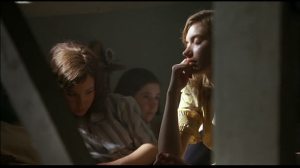

The film noticeably contains absolutely no male characters, aside from the few brief scenes outside the school. I mention this because I do not want to force a Queer view onto the film, but it calls for one quite clearly. The tension is there from the opening moments of the film. This is one of the most interesting aspects of the film to me. The genre obviously carries numerous examples of this, but I cannot think of another film off the top of my head that treats its subject in such a way as to balance its flights of fancy with an equal sense of dark paralysis.
Some have/will criticize the film for its lack of development near the end. We naturally have questions. I have questions about the Juno Temple character, Di, and how her experience here informs her own sexuality. The film chooses to leave this aside, despite my feeling that this is in large part what her character development is about (and by extension what a significant portion of the film is partially about). Scott seems to intentionally ride-the-line between innocent girlishness and full-on homo-infatuation (if you will excuse the uncouth phrase) in a way that is entirely non-verbal. This is frustrating, but not altogether unaccomplished. Miss G equally acts alongside the girls (or perhaps more so) as if she lives within a fanciful story, yet because she is an “adult” the film occasionally reveals her true emptiness of character as a person. The ‘midnight feast’ scene comes to mind with Temple in her quasi-drag paste-on mostauche, crouching in candlelight, applying makeup to the Spanish princess. The scene screams for an intimacy that is beyond the years (in age) of the girls. Contrasting this with the subsequent scene of said princess with Miss G underlines that innocence. As I write these veiled not-so spoilery thoughts, I want to make the comparison to Sofia Coppola‘s The Virgin Suicides. Cracks is, in my mind, a much more accomplished take on this time of adolescence. Perhaps this is merely because it avoids the music-video-like aesthetic for a more conventionally ‘painterly’ cinematography (perhaps it is too simplistic to attribute this to a stereotypical difference between American and British visual tastes?). Though perhaps its superiority comes from its being made by a woman more mature (in age and obvious influence) in her debut film.


A more tangential thought follows here about how children learn from their filmmaker parents. It wouldn’t be fair to compare these individuals on the basis of one film (or retrospectively across an unbalanced output), but I find it interesting, personally, that I am more impressed with this debut than Sofia Coppola’s, because I have recently come to realize how much of the output of Ridley Scott that I consider as ‘auteuristly groundbreaking’ (or whatever you want to call it) as that of Francis Ford Coppola. Trailing back off into the land of incomprehension now….
